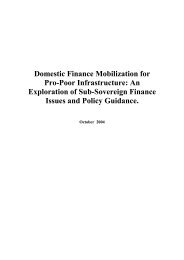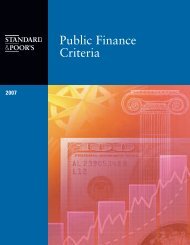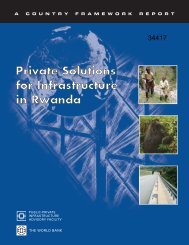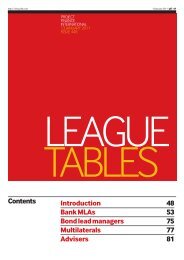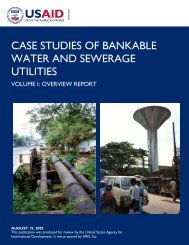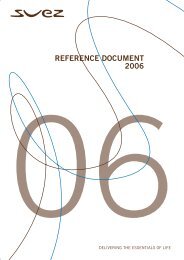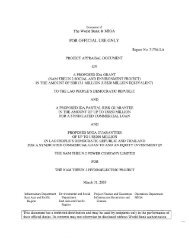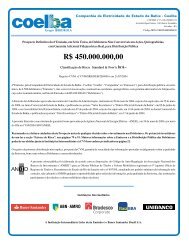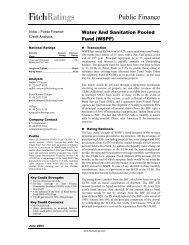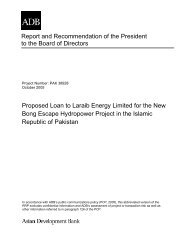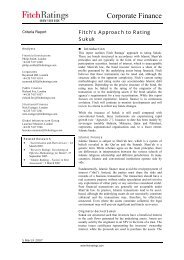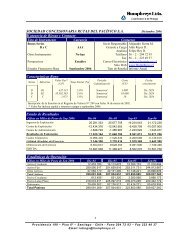EAP - The Pacific Infrastructure Challenge - World Bank (2006).pdf
EAP - The Pacific Infrastructure Challenge - World Bank (2006).pdf
EAP - The Pacific Infrastructure Challenge - World Bank (2006).pdf
You also want an ePaper? Increase the reach of your titles
YUMPU automatically turns print PDFs into web optimized ePapers that Google loves.
<strong>The</strong>se benchmarking initiatives could be strengthened as a driver of efficiency and<br />
sector reform if the results were made public. Currently electricity sector<br />
benchmarking data can only be reviewed by PPA member organizations, and no<br />
member can publish this information. This has resulted in several separate<br />
benchmarking studies being carried out each time this sort of information is required.<br />
Each time infrastructure performance information is needed, consultants, donors or<br />
lending agencies must request the information directly from each utility, creating a<br />
further capacity burden on countries with limited human resources. In addition,<br />
keeping the results confidential does not help to create the incentives for improved<br />
efficiency one could expect from such a program.<br />
Other sectors would also benefit from benchmarking initiatives. If this were initiated,<br />
there would be value in considering a regional infrastructure benchmarking unit,<br />
which would take responsibility for developing measures, gathering consistent and<br />
accurate data, and publishing sector reports. A non-country specific unit of this<br />
nature would help to ensure objectivity, and would help to overcome capacity and<br />
capability constraints.<br />
Box 7.4: Examples of Successful Benchmarking<br />
Performance benchmarking has been employed successfully in the water and<br />
sewerage sector in England and Wales. Utilities provide OFWAT (the regulator) with<br />
service performance data, which is then published in a set of ‘performance<br />
scorecards’. It has also been implemented successfully in Sao Paulo and Indonesia.<br />
Here, benchmarking brought about significant improvements in pollution levels,<br />
following the publication of industry ratings on environmental compliance.<br />
Benchmarking has also been effective in the urban Water and Sanitation sector in<br />
Vietnam. Data were collected from 67 urban water companies, reviewed by the <strong>World</strong><br />
<strong>Bank</strong> and the water utilities for consistency and reasonableness, and used to compile<br />
a performance baseline and performance targets for water utilities. <strong>The</strong>se<br />
performance targets are being used to define the eligibility criteria of water utilities to<br />
access credit under the Vietnam Urban Water Supply Development Project.<br />
Source: “Utility Benchmarking” B Kingdom and V Jagannathan, March 2001; IBNET<br />
Benchmarking in the Urban Water Sector Vietnam<br />
Developing an effective benchmarking program involves 17 :<br />
Choosing measurable and meaningful indicators of performance:<br />
– Some indicators may be expressed as indices that are adjusted for<br />
different operating conditions<br />
– Indicators should draw on data that can be relatively easily or reliably<br />
collected, and that are unambiguous<br />
– Indicators should reflect conditions over which the service providers<br />
have control<br />
Using an independent, international body to compile the data and analyze<br />
the results<br />
Communicating performance results in a way that will allow the public to<br />
make an informed assessment of relative performance, and set realistic<br />
expectations for improvements<br />
Publicizing the results<br />
Creating incentives and penalties that reward good service providers and<br />
encourage underperformers to improve.<br />
17 “Utility Benchmarking” Viewpoint, March 2001, B Kingdom and V Jagannathan<br />
45



